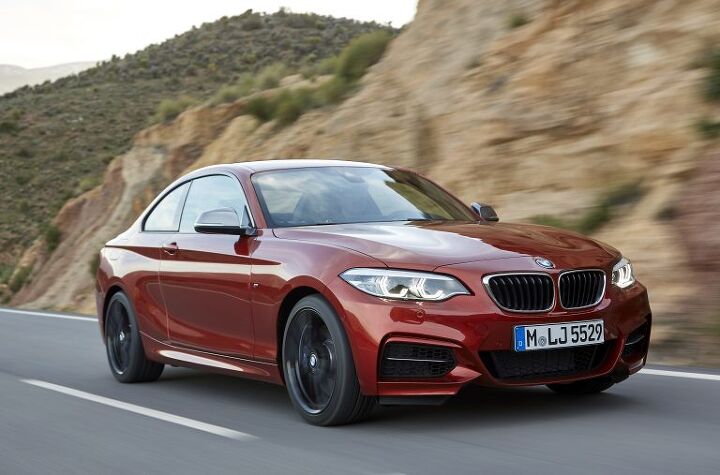BMW Drops Manual Transmission From Best Model to Help Pay for R&D

BMW plans to streamline its manufacturing process by providing fewer model variants and eliminating less popular engine or equipment options. The goal here is to free up capital for research and development spending in the coming years, according to a Wednesday announcement from the brand’s chief finance officer, Nicolas Peter.
With most German automakers already pushing heavily into the realm of electric vehicles, BMW’s strong presence in China is forcing it to further bolster its efforts in EV development. The country’s particularly aggressive emission regulations and mandates on electric vehicle sales means any manufacturer hoping to persist within its borders will have to ensure 12 percent of its fleet is electric by 2020 — and BMW isn’t ready.
As a result, the automaker is trimming fat wherever it can find it. Unfortunately, that means eliminating the manual gearbox for the 2 Series in the United States and abandoning certain engine options for models across the globe. While BMW wasn’t explicit as to which motors won’t be returning, odds are good it will be the fun ones that don’t sell as well, plus the diesels.
“In the 5 series we have four diesel engines on offer. I would not bet on there being four diesel engines on offer in the next generation vehicle,” Peter explained.
While depriving North America of a manual transmission variant of its most enjoyable-to-drive car won’t win it new fans, BMW is responding out of necessity. According to Reuters, the automaker spent 5.5 percent of its total revenue on R&D in 2016 and needs to bring that up swiftly if it is to have EVs ready for China.
While sales in the U.S. have stagnated slightly, BMW has witnessed double-digit sales growth in China and remains on track to keep pace with the launch of a longer-wheelbase 5 Series and a new X1, Peter said. But only if it can keep itself in the electric car game by boosting development, hence the cost-cutting measures.
However, BMW can’t simply terminate whole models from its lineup and expect to immediately turn a profit from electric vehicle sales — which are still weak, even globally. It needs to maintain internal combustion volume, but it doesn’t need to provide those vehicles with a plethora of options.
“We have over one hundred steering wheels on offer. Do we need that many variants?” Peter asked reporters.
If you can remember back to the 1990s, when Chrysler seemed to have only two steering wheels for its entire fleet, then you already know the answer to the question. No, of course not. No automaker needs one hundred distinctive steering wheels. That’s absolutely insane and BMW is right to scale back on them. We just wish they’d have stopped there and decided not to take away the manual-transmission 2 Series, as well.
[Image: BMW AG]

Consumer advocate tracking industry trends and regulations. Before joining TTAC, Matt spent a decade working for marketing and research firms based in NYC. Clients included several of the world’s largest automakers, global tire brands, and aftermarket part suppliers. Dissatisfied, he pivoted to writing about cars. Since then, he has become an ardent supporter of the right-to-repair movement, been interviewed about the automotive sector by national broadcasts, participated in a few amateur rallying events, and driven more rental cars than anyone ever should. Handy with a wrench, Matt grew up surrounded by Detroit auto workers and learned to drive by twelve. A contrarian, Matt claims to prefer understeer and motorcycles.
More by Matt Posky
Latest Car Reviews
Read moreLatest Product Reviews
Read moreRecent Comments
- Normie WHY must they put those NFL wheels on everything, particularly on cars that were sublime to begin with? Fat tires = smoother ride.
- Jeff Definitely a blast from the past. I would have picked a Cutlass or Monte Carlo over this at the time.
- Cae The front end reminds me of how far we've come with aerodynamic design. This is clearly a pre-Oil Embargo styling effort. Today, the front ends of cars and SUV's are not as Baroque like this, but you don't lose 2 mpg because of all that bent metal, either (YMMV).
- Bd2 418 views, 10 days ago on Youtube. Seriously ?
- Redapple2 That is one ugly car.


































Comments
Join the conversation
Sad. Never driven a 2 but I imagine they're loads of fun. I swapped into a lease on a 6 speed M3, and while it can pin me back in the seat while while guiding me to my destination and playing music through a decent stereo, its obnoxious rather than subtle and I'm sure it would be a nightmare after warranty. Someone else may pay to preserve it, but I'll focus on keeping my E39 M5 on the road instead. That'll be more satisfying and probably cheaper too. Sure every automaker is struggling to evolve, but this move by BMW feels like the nail in a coffin that's already welded shut.
Here's a free cost cutting suggestion. Use and or design amber rear turn signals that can work globally and not just outside North America. The BMWNA tail lights are quite inferior to the ECE versions and by some smart engineering I am sure they could solve this problem.